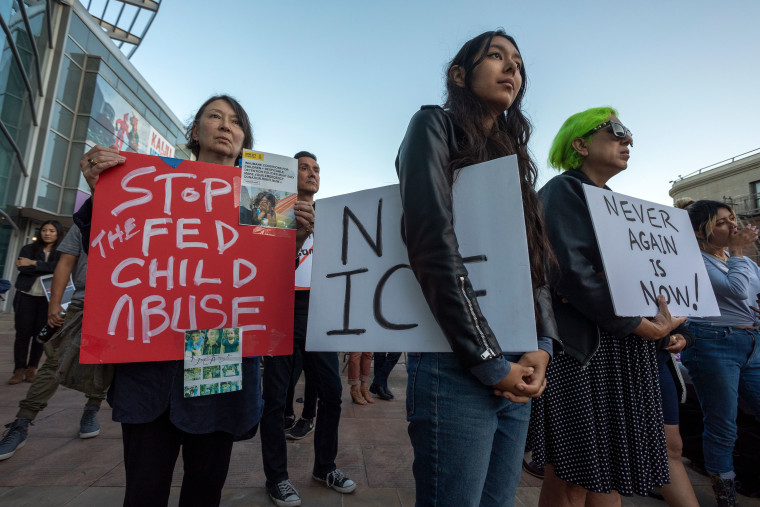 Protestors rally at the Japanese American National Museum, against the Trump administration's plan to use Fort Sill to detain migrants — Fort Sill was used as a concentration camp for people of Japanese descent during the second World War. June 9, 2019
DAVID MCNEW/AFP/Getty Images
Protestors rally at the Japanese American National Museum, against the Trump administration's plan to use Fort Sill to detain migrants — Fort Sill was used as a concentration camp for people of Japanese descent during the second World War. June 9, 2019
DAVID MCNEW/AFP/Getty Images
The past few months have seen a rise in reports of horrifying conditions and treatment suffered by migrant detainees at facilities in and around the southern border of the United States. Unsanitary conditions, inhumane guards, extreme overcrowding, a lack of access to sufficient food and medicine, and family separation are taking place in both for-profit and government-run camps.
Outside observers continue to sound the alarm. Lawyers and doctors who observed compounds in Texas compared them to "torture facilities." Warren Binford, a child's rights activist, claimed a guard at an El Paso facility made children sleep on the floor as punishment for losing a lice comb. Last weekend, a group of Democratic lawmakers visited Clint and El Paso facilities and continued to sound the alarm as news broke of a Facebook group of nearly 9,500 current and former CBP personnel containing racist memes targeting immigrants.
There's been a lot of debate about what to call these places. Representative Alexandria Ocasio-Cortez faced intense criticism from Republicans in June when she called the facilities "concentration camps." For weeks she was accused of belittling the Holocaust with her analogy, including by the United States Holocaust Memorial Museum. But on July 1, over 400 Holocaust and genocide experts signed an open letter urging the Museum to retract its statement condemning Ocasio-Cortez's analogy.
The semantic arguments might be great for cable news ratings, but it's far from the most pressing issue. Human beings continue to suffer trauma and even die in custody for the crime of hoping for a better life. It's time for anyone who wants this to end to take action. Here are a few ways:
Donate to organizations directly helping the detained
While They Wait: A fund for asylum seekers co-organized by Brooklyn Defender Services and RAICES, a Texas-based immigrant legal aid service. The fund provides money to "help pay for necessities, cover immigration fees, and secure legal services." Donate here, or become a RAICES volunteer here.
Pueblo Sin Fronteras: You might have caught FOX News scaremongering about caravans while watching TV with your grandparents. These processions are full of people escaping places like Venezuela and Honduras, countries with repressive and brutal governments, and are organized under the philosophy that there is safety in large numbers. Donate here.
KIND: Kids In Need Of Defense focuses on obtaining legal representation for children who travel hundreds or thousands of miles by themselves to seek asylum. Donate here.
Attend a protest
On Friday July 19, hundreds of cities across the United States will take part in Lights for Liberty: A Vigil to End Human Concentration Camps. Vigils will also be held at the camps themselves. Find one you can attend here.
Keep track of CBP and ICE abuses
The media may be paying attention now, but you can't expect the focus on this issue to hold. To keep yourself informed, United We Dream has a rolling feed of all the reported abuses and deaths at detention facilities and camps across the country. Even if you click just this once, you'll be shaken to see all the atrocities lined up one after the other.
Help create a political party that reflects your priorities
Last week, Democrats in the House and Senate caved to Republicans and approved a $4 billion "emergency funding package" for the border that does nothing to rein in the Trump's administration's concentration camps. Voting during elections isn't enough — choosing candidates to run who will protect the most vulnerable should be non-negotiable. Writing at Splinter, Paul Blest is indignant and incisive as he breaks down the timeline for how Democrats caved, and why every person who voted for the package deserves a primary challenge from someone who wouldn't.
Till then, you can sign the #CloseTheCamps petition created by MoveOn.org.